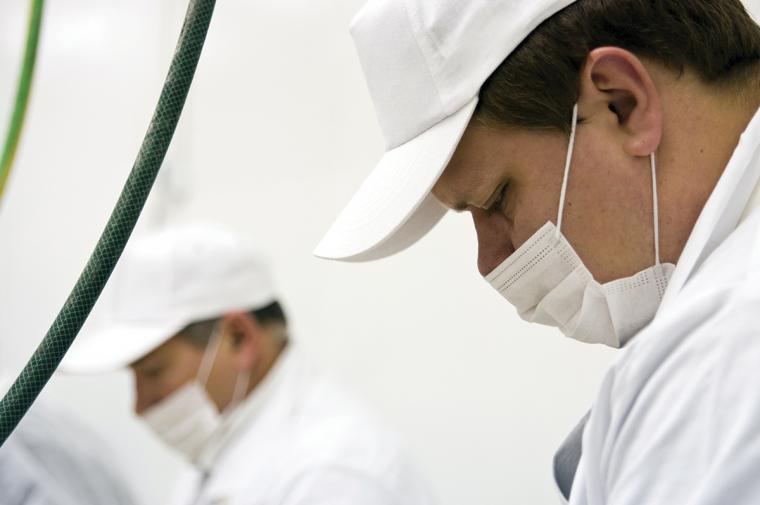

States with large agricultural footprints that began the growing season early, such as California and Florida, have reported sharp increases in infection among farmworkers, who frequently reside together. More northerly states are anticipating spikes just as the later summer and early fall harvest seasons begin as migrants move further north to find work, in some cases bringing COVID-19 infections with them.
Social distancing guidelines are relatively easy to implement for workers who spend their days in fields. The bigger risks come in plant facilities that process and package foods. In these facilities, employees working indoors in close quarters have spread the virus, resulting in infection rates similar to those found in meat packing plants, which were early hot spots for virus transmission.
Safety Practices Are Not Infallible
The CDC has stated that workplace prevention practices should follow the hierarchy of controls, a system used by industrial companies to minimize or eliminate exposure to hazards. The system includes using source control and a combination of engineering controls, administrative controls (especially proper sanitation, cleaning and disinfection) and personal protective equipment (PPE). In many cases, however, the nature of the production processes makes it difficult for workers to remain physically separated from one another.
No control system is failsafe, and infections have occurred despite precautions. In response to these concerns, some companies have had employees sign waivers to protect the business should workers become sick. While the desire to do so may seem understandable on its face, workers’ rights groups are sounding the alarm, noting that these waivers are forcing employees to sign away their rights if they become ill.
To date, five states — North Carolina, Oklahoma, Arkansas, Alabama, and Utah — have written liability limitations for employers into law, either through direct legislation or executive orders. Others are considering following suit, and some business groups — the U.S. Chamber of Commerce among them — are actively lobbying the federal government to implement national liability protections.
Are Liability Waivers a Good Idea?
Some companies that have considered adopting the waivers have decided against them, and for good reason, according to Aaron Goldstein, a labor and employment partner at the international law firm Dorsey & Whitney. Goldstein, who is based in Seattle, has been advising businesses on measures that should be taken since the COVID-19 crisis began.
“In my experience, many employers have looked into the idea but ultimately rejected it since the waivers are unlikely to be helpful,” Goldstein told Trade & Industry Development.
Employees have various rights regarding the workplace, including the right to a work environment free of serious recognized hazards and, in most states, a right to workers’ compensation for work-related injuries or illnesses. In almost all cases, employee waivers regarding claims that haven’t yet arisen are ineffective, including a waiver of liability for any injuries or illness a worker might suffer in the workplace in the future. From a legal perspective, employees cannot waive OSHA or workers’ comp claims, especially when the injury – or infection, in this case – hasn’t happened yet.
What About State Efforts to Address Liability?
States have addressed the issue of liability for COVID-19 claims very differently. The governor of Arkansas issued an executive order attempting to eliminate liability for negligence claims related to COVID-19. On the flip side, the governor of California issued an executive order creating a presumption that those workers who contract COVID-19 contracted it on the job. California’s action will make it easier for employees to receive workers’ compensation benefits, according to Goldstein. States with executive orders similar to Arkansas’ may find that the state-implemented rules limiting liability have no legal teeth.
“Waivers aimed at employees are going to be very hard to enforce across all states since many employee protections, such as OSHA, are federal,” he noted.
The Wrong Message to Employees
Many workers are on the fence about returning to their jobs. They need to work and don’t want to risk losing their jobs, but with unemployment drying up, they’re feeling pressure to return despite their misgivings. They may have medically compromised family members at home. They may also be looking for assurances that their health and safety concerns are being taken seriously, and liability waivers send the opposite message, said Goldstein.
“Employers want to communicate the steps they are taking to keep their employees safe, not send the message that the employer is trying to avoid responsibility for the risks employees face in the workplace,” he said. “Making employees sign COVID-19 related waivers suggests that a company is trying to avoid liability, not by keeping their employees safe, but by foisting the risk of COVID-19 related harm on its workers. The media attention that companies that have required their employees to sign waivers have received has been universally bad.”
The Potential for Public Relations Catastrophes
With public opinion firmly on the side of protecting employees, and employers’ actions scrutinized by traditional media as well as social media, the process of requiring workers to sign waivers could present serious perception problems for employers, according to Goldstein, particularly in an era that’s all about “optics.”
“I have heard of a few food service companies requiring waivers and those companies have faced a PR backlash,” he said.
With Americans being more careful about where they spend their money, resulting in slimmer margins for many companies, public backlash resulting from a negative PR campaign could be economically disastrous. This should be balanced against any perceived benefits having employees sign the waivers might produce.
“Since employee COVID-19 liability waivers are unlikely to be enforceable, and present strong risk for negative publicity, there is little to be gained and much to be lost by demanding such waivers from employees,” said Goldstein.
Most employers already have protection from liability under the exclusive remedy provisions of state workers’ compensation statutes, which makes a worker’s compensation claim (as opposed to a lawsuit against the employer) the sole remedy for a workplace related injury in most cases. Some states, such as California, have also adopted rules that exclude COVID-19 claims from an employer’s workers’ compensation experience rating. As a result, COVID-19 related claims will not cause an employer’s workers’ compensation taxes to go up in California.
Instead of rushing to have employees sign liability releases, companies should ensure they remain informed of and follow current public health guidelines from federal and state agencies, redesign processes and workspaces with safety and distancing in mind where possible, and ensure they’re providing the proper personal protective gear workers need to do their jobs safely. Keep in mind that regulations may vary from region to region, and that some public health guidance is presented as “advisory,” meaning that companies aren’t legally obligated to follow it, but public health experts highly recommend the precautions. Seeing their employers taking science-backed steps to curb infections, employees will feel more confident about returning to work, or remaining at work. Be sure to communicate all the health-related steps your organization is taking clearly and regularly with workers. T&ID

